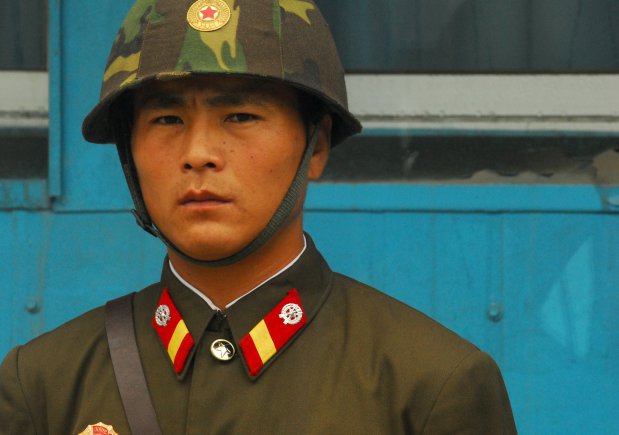Pyongyang Looking at Moscow
In the Yeltsin era, North Koreans were not welcome guests at the Kremlin. After the break-up of the Soviet empire, Moscow pressed for debt repayment and started to suggest that the North Korean nuclear programme needed to be put under control. But times changed, along with the Kremlin administration.
April 13, 2012 -
Nicolas Levi
-
Articles and Commentary

North_Korean_Soldier.jpg
Vladimir Putin had a different idea for arranging relations with the North Korean regime. Shortly after assuming the office of president he became the first “Western” leader to pay an official visit in Pyongyang. Mutual cooperation flourished. The amount of trade between the two states is now approaching the levels comparable to Soviet times.
The figures are compelling: before the collapse of the Soviet state, trade amounted to about one billion dollars, in the early Yeltsin era it fell to just 70 million and after 2000 it soared again and now reaches 800 million dollars. The primary Russian export commodity is oil, providing energy security for North Korea (65% of exports to North Korea), and steel products (10%).
Russia has become a window to the modern world for North Korea, maintaining regular relations with Pyongyang and having an impact, albeit modest, on North Korean elites. Unfortunately, the role of Moscow on the Peninsula is very often ignored and underestimated. Pyongyang is aware that it needs Russia more than Russia needs North Korea.
A few months ago a young leader with no direct links to Moscow assumed power in North Korea. He did not study in Russia, unlike some other important representatives of North Korean elites (such as Jang Sung-taek and Kim Kyung-hee). Kim Jong Un was not born in Russia (unlike his father and the former ruler Kim Jong Il), he does not speak Russian (unlike his brother Kim Jong Nam), he had not been a Soviet agent (unlike his grandfather Kim Ir Sen, founder of North Korea). And therefore Kim Jong Un will treat Russia purely instrumentally rather than sentimentally like his father, who liked to travel there.
The North Korean establishment is aware that it must rely on the support of the Russian Federation, for Pyongyang is on the brink of bankruptcy: economic aid is a factor making the North Koreans want to deepen their cooperation with Russia. In contrast to the new leader Kim Jong Un, the elites also have sentimental connections with Russia. Jang Sung-taek, the de facto ruler of North Korea, studied in Moscow where he met his current wife and Kim Jong Un’s aunt, Kim Kyung Hee.
The couple are aware of the importance of Russia and personally look after the interests of Russian companies in North Korea. The politicians who are currently in charge of the North Korean economy (Ri Ryong Nam, Pak Sung Kil) frequently visit Russia and try to persuade the Russian business circles to invest in the north of the Korean Peninsula. The army commanders are also strongly attached to the Russians: the top echelons of the Korean People’s Army earned their education in the country of the Northern neighbour. We could name here Kim Jong Chun (who studied at the Frunze Military Academy in Russia) or O Kuk Ryol, a personal adviser to Kim Jong Un who studied in the Soviet Union and speaks fluent Russian. We must also remember that Russian specialists teach at North Korean military academies.
Rather terrifyingly, the cooperation between Moscow and Pyongyang is not limited to economic or military contacts. About ten thousand North Koreans, arbitrarily selected by the government, work in Russian labour camps as part of debt repayment. The camps are currently located in the Russian Far East, where the Koreans work all year long. They are allowed only two days off annually.
Unfortunately, it seems that the number of such forced labour camps in Russia will grow, for the North Korean debt with Russia stands at almost four billion dollars.
Nicolas Levi is an analyst for Korean issues at the Centre for Poland-Asia Studies and a Ph.D. student at the Institute of Political Studies of the Polish Academy of Sciences.
Translated by Tomasz Bieroń


































